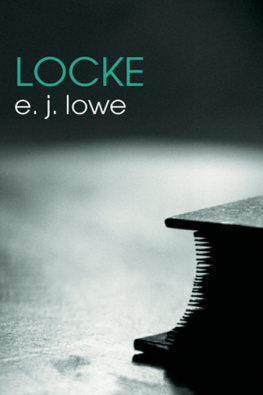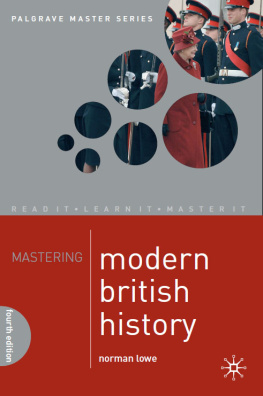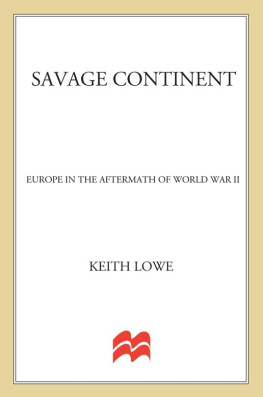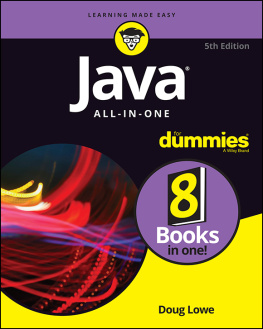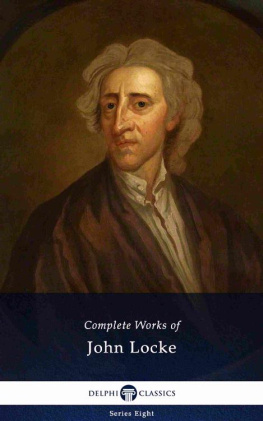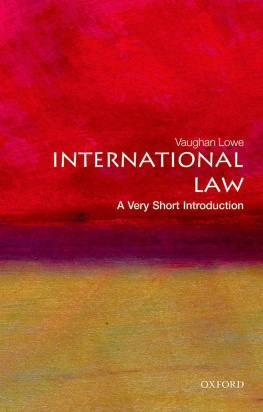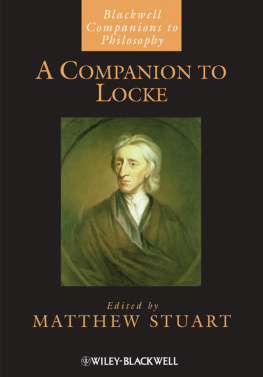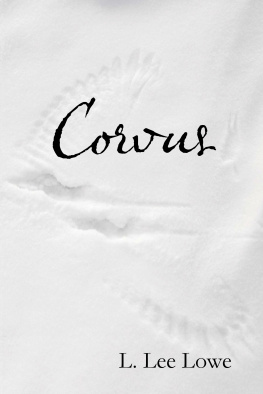Lowe - Locke
Here you can read online Lowe - Locke full text of the book (entire story) in english for free. Download pdf and epub, get meaning, cover and reviews about this ebook. publisher: Taylor and Francis, genre: Religion. Description of the work, (preface) as well as reviews are available. Best literature library LitArk.com created for fans of good reading and offers a wide selection of genres:
Romance novel
Science fiction
Adventure
Detective
Science
History
Home and family
Prose
Art
Politics
Computer
Non-fiction
Religion
Business
Children
Humor
Choose a favorite category and find really read worthwhile books. Enjoy immersion in the world of imagination, feel the emotions of the characters or learn something new for yourself, make an fascinating discovery.
Locke: summary, description and annotation
We offer to read an annotation, description, summary or preface (depends on what the author of the book "Locke" wrote himself). If you haven't found the necessary information about the book — write in the comments, we will try to find it.
Lowe: author's other books
Who wrote Locke? Find out the surname, the name of the author of the book and a list of all author's works by series.
Locke — read online for free the complete book (whole text) full work
Below is the text of the book, divided by pages. System saving the place of the last page read, allows you to conveniently read the book "Locke" online for free, without having to search again every time where you left off. Put a bookmark, and you can go to the page where you finished reading at any time.
Font size:
Interval:
Bookmark:

Locke
an admirable introduction written by a real philosopher with a real philosophical interest in Locke.
Andrew Pyle, Bristol University, UK
a wonderful contribution to the understanding of Locke by non-specialists.
Dan Kaufman, University of Colorado, Boulder, USA
Routledge Philosophers
Edited by Brian Leiter
University of Texas, Austin
Routledge Philosophers is a major series of introductions to the great Western philosophers. Each book places a major philosopher or thinker in historical context, explains and assesses their key arguments, and considers their legacy. Additional features include a chronology of major dates and events, chapter summaries, annotated suggestions for further reading and a glossary of technical terms.
An ideal starting-point for those new to philosophy, they are also essential reading for those interested in the subject at any level.
| Hobbes | A. P. Martinich |
| Leibniz | Nicholas Jolley |
| Locke | E. J. Lowe |
| Hegel | Frederick Beiser |
| Rousseau | Nicholas Dent |
| Schopenhauer | Julian Young |
| Freud | Jonathan Lear |
Forthcoming:
| Spinoza | Michael Della Rocca |
| Hume | Don Garrett |
| Kant | Paul Guyer |
| Fichte and Schelling | Sebastian Gardner |
| Husserl | David Woodruff Smith |
| Rawls | Samuel Freeman |
E. J. Lowe
Locke

First published 2005
by Routledge
2 Park Square, Milton Park, Abingdon, Oxon OX14 4RN
Simultaneously published in the USA and Canada
by Routledge
270 Madison Ave, New York, NY 10016
Routledge is an imprint of the Taylor & Francis Group
2005 E. J. Lowe
Typeset in Joanna MT and Din by
RefineCatch Ltd, Bungay, Suffolk
Printed and bound in Great Britain by
TJ International Ltd, Padstow, Cornwall
All rights reserved. No part of this book may be reprinted or reproduced or utilised in any form or by any electronic, mechanical, or other means, now known or hereafter invented, including photocopying and recording, or in any information storage or retrieval system, without permission in writing from the publishers.
British Library Cataloguing in Publication Data
A catalogue record for this book is available from the British Library
Library of Congress Cataloging in Publication Data
Lowe, E. J. (E. Jonathan)
Locke / E. J. Lowe.
p. m. (The Routledge philosophers)
Includes bibliographical references (p. ) and index.
ISBN 0415283477 (hardcover) ISBN 0-415283485 (pbk.)
1. Locke, John, 16321704. I. Title. II. Series.
B1297.L69 2005
192 dc22
2004017847
ISBN 0415283477 (hbk)
ISBN 0415283485 (pbk)
Preface
My aim in this book is to expound and evaluate a representative sample of John Lockes philosophical views, focusing on certain major areas of his work that I judge to have been of lasting interest and importance. Owing to the great size of Lockes literary output and the broad scope of his philosophical concerns, I concentrate on the central core of his intellectual system: his theory of knowledge, his metaphysics, his philosophy of mind, and his philosophy of language as they are developed in the Essay Concerning Human Understanding and his political philosophy, as it is represented in his Second Treatise of Government. However, I also make mention of some of Lockes other influential works in to give a broader overview of his work.
There have been several good studies in recent years of specific aspects of Lockes philosophy as well as some dealing with his life and work more generally. The present book is distinctive in a number of respects. First, it includes an account of Lockes personal history and intellectual development which does not presume that its readers will already be familiar with the general circumstances of English political and intellectual life in the seventeenth century. Second, it does not assume an extensive acquaintance with presentday philosophical debates, doctrines and terms that are relevant to the evaluation of Lockes philosophy. Third, on many particular issues the interpretation of Lockes views that it advances differs significantly from those of other recent commentators and scholars. It is not in any sense a rival to my own earlier book, Locke on Human Understanding (London and New York: Routledge, 1995), although it does complement that book in various ways. The earlier book focuses exclusively on the Essay Concerning Human Understanding and is intended to guide its readers through that particular text. In the present book, I am also concerned with other aspects of Lockes work, notably his political philosophy, while at the same time being more selective in my choice of topics on which to concentrate. However, I do take the opportunity here to develop, modify or further defend some of the interpretations of Lockes views that I advanced in the earlier book, as well as to present in an accessible form the results of other work that I have done on Lockes philosophy since that book appeared.
My primary intention is that this book should provide something specifically suited to the needs of students and general readers who are newcomers to Lockes philosophy with little specialized knowledge of recent developments in academic philosophy or Locke scholarship. Thus it may serve as a general introduction to Lockes thought for undergraduate students of philosophy and related disciplines. At the same time, I include material which will, I hope, be of some interest to Locke scholars, historians of philosophy and philosophers concerned with the current debates that Lockes thought has influenced. For the benefit of non-specialist readers, I have included a glossary of philosophical terms at the end of the book. This explains the meanings of certain important terms which recur frequently or figure prominently in Lockes writings or in discussions of Lockes philosophy. Following each chapter, I have provided some suggestions for further reading. A consolidated bibliography appears at the end of the book.
Acknowledgements
In writing this book, I have in various places drawn upon, adapted or developed work of mine that has appeared in print elsewhere in recent years, mostly in journal articles which some readers of the book may not find easily accessible. I am indebted to the editors and publishers concerned for permission to do this. In , I draw upon my article Locke: Compatibilist Event-Causalist or Libertarian Substance-Causalist?, Philosophy and Phenomenological Research 68 (2004), pp. 688701.
I am grateful to Brian Leiter, the series editor, and to Tony Bruce of Routledge for encouraging me to write this book, and to them as well as to three anonymous readers for very helpful suggestions concerning its content.
Chronology
| 1632 | Locke is born in Wrington, Somerset. |
| 1647 | Locke is admitted to Westminster School. |
| 1649 | Charles I is executed in London. |
| 1652 | Locke enters Christ Church, Oxford. |
| 1656 | Locke graduates as a Bachelor of Arts of the University of Oxford. |
| 1658 | Locke graduates as a Master of Arts of the University of Oxford. |
Font size:
Interval:
Bookmark:
Similar books «Locke»
Look at similar books to Locke. We have selected literature similar in name and meaning in the hope of providing readers with more options to find new, interesting, not yet read works.
Discussion, reviews of the book Locke and just readers' own opinions. Leave your comments, write what you think about the work, its meaning or the main characters. Specify what exactly you liked and what you didn't like, and why you think so.

